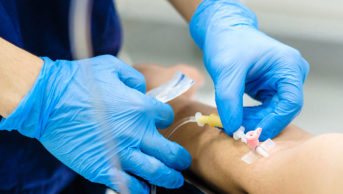
Shutterstock.com
Around 13,000 adults in England will be eligible for the “first and only” treatment recommended by the National Institute for Health and Care Excellence (NICE) for acute migraine, the body has said.
In final draft guidance, published on 14 September 2023, NICE recommended rimegepant for people who have tried at least two triptans — another class of medicines used to treat migraines — unsuccessfully.
Rimegepant was previously approved for prevention of migraines for patients who have at least 4 and fewer than 15 migraine attacks per month, in guidance published by NICE on 5 July 2023.
The treatment, administered as a dissolvable wafer placed underneath the tongue, is a calcitonin gene-related peptide (CGRP) receptor antagonist, which blocks the release of the protein CGRP, which is believed to cause the severe pain associated with migraines. There are also injections available that target CGRP, but rimegepant is the first available oral option.
NICE also recommends rimegepant for adults who are not able to take triptans and have tried non-steroidal anti-inflammatory drugs (NSAIDs).
In the guidance, NICE said the “most likely cost-effectiveness estimates are below or within” what it considers to be “an acceptable use of NHS resources”.
It added that evidence from clinical trials for acute migraine shows that rimegepant is more likely to reduce pain at two hours than placebo.
The guidance follows approval of the drug in Scotland by the Scottish Medicines Consortium (SMC) on 11 September 2023, which recommended rimegepant for adults who have at least four migraine attacks per month. Rimegepant was approved by the SMC on 9 May 2023 for the acute treatment of migraine.
Helen Knight, director of medicines evaluation at NICE, said: “This is the first and only NICE-recommended medicine that can help alleviate the misery of acute migraines and may be considered a step-change in treatment.”
She added that migraine is “an invisible disability” and the draft guidance “addresses the high unmet need for treatment options for acute migraine”.
In a statement, the Migraine Trust said that rimegepant was safe for people with cardiovascular disease as, unlike triptans, it does not constrict or tighten blood vessels.
It added that rimegepant is not known to cause medication overuse headache, which is associated with triptans, NSAIDs and other painkillers.
“Medication overuse headache is a significant problem for people with migraine. A survey of 1,800 people with migraine that we ran in 2019 found that migraine medication had caused medication overuse headache in a third of people (34%). We believe that rimegepant is an important opportunity to help those who have medication overuse headache and prevent others from developing it,” the statement said.
Rob Music, chief executive of the Migraine Trust, said: “In addition to physical symptoms, such as pain, migraine can have a detrimental impact on ability to work, attend education, socialise and plan activities. The mental health impact can be significant.
“Rimegepant can be easily taken as a tablet and brings a valuable new option to those who live with the condition. We hope patients who will benefit from it will be able to access it quickly.”
NICE expects to publish its final recommendations on rimegepant in October 2023.


